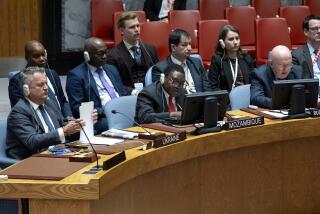Back to Basics
The overwhelming vote electing Federico Mayor Zaragoza as director general of the United Nations Educational, Scientific and Cultural Organization was reassuring. Mayor is committed to efficient administration and to re-focusing UNESCO on solving the major problems, including literacy, for which it was established.
American officials have made no promise to resume membership, nor should they. The maneuvering of a substantial number of UNESCO members in favor of the outgoing director general, Amadou Mahtar M’Bow of Senegal, continued until the last minute, a reflection of the divisive forces that undergirded the controversial and ideological rule of M’Bow. The election of a reform-minded leader will be useful only to the extent that he wins wide approval among the member states to return the organization to its fundamentals. In the end, 142 of the 150 member nations voted for Mayor. The next test will come when he seeks members’ votes for the changes that inevitably must be made if the organization is to regain world credibility.
At another U.N. specialized agency, the Food and Agriculture Organization, Edouard Saouma, another controversial director general, was reelected Monday in a close vote, 94 to 59. Many Western nations, including the United States and Canada, favored a change after 12 years under the directorship of Saouma. The FAO, largest of the specialized agencies, has not been beset by the same degree of troubles as UNESCO, but Saouma has run it with an arbitrary and autocratic style, short on statesmanship and long on building Third World majorities that have polarized members. Perhaps the closeness of his reelection will moderate his style and help restore the sagging morale of the 7,000 staff members.
Both UNESCO and FAO have been crippled by shortfalls of funds exacerbated at UNESCO by the withdrawal of the United States, Britain and Singapore, and at FAO by the failure of the United States to pay all that it owes. The work of FAO is too important, in the fragile circumstances of hunger in the developing nations, for Congress to continue this treaty violation.
More to Read
Sign up for Essential California
The most important California stories and recommendations in your inbox every morning.
You may occasionally receive promotional content from the Los Angeles Times.










